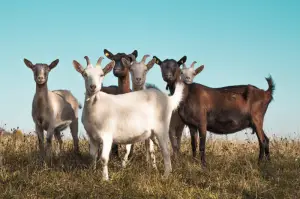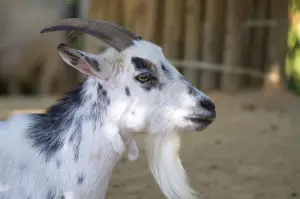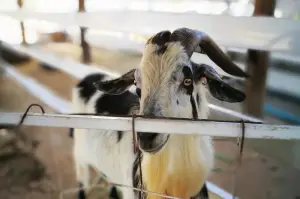Do Goats Smell Bad?
Have you ever heard someone refer to another as “smelling like a goat”? This isn’t a compliment. Anyone who has been around a working goat farm for more than a visit will understand the reference all too well.
Do goats smell bad? While goats do not generally have an offensive odor, there is no smell like a male goat in rut. A buck will welcome the breeding season using both his strong scent glands and his own urine. The odors with which he covers himself (and his surroundings) help him to attract a female in heat.
This will likely lead you to other questions (like how a buck uses his own urine to attract does). Nature is certainly fascinating, and if you have questions about how smelly goats attract females, we have the answers for you. Read on to learn more about the stench of a male goat in rut, and how it can affect the does.
Goat Smell Changes With The Seasons 
Goats are not always stinky, and in fact, you are likely to notice no real odor at all if you are visiting does, wethers, or even bucks outside of the breeding season.
But as is the case with most animals, things can get a little weird when hormones come into play.
Male Goats Perfume Themselves
Goats are not the only mammals to use scent to attract the opposite sex – humans spend billions of dollars on perfume and cologne every year. The olfactory sense is a powerful one, and mammals of all sorts have been using this to their advantage since the beginning of time. Goats have no need of an artificial perfume, however, as they have unlimited access to all they need to attract a female.
When a buck senses a doe in heat, he will display a few different behaviors in his attempt to gain her affection. One of these behaviors involves urinating on himself.
Not only will a buck intentionally urinate on his legs and his chest, but he will also bend down while marking so that he can urinate on his own beard. As goats are not regular bathers, this urine will dry on their bodies and their beards (often giving a light-colored buck a yellowed hue), building up in sticky residue until a doe simply cannot resist him.
Do Goats Smell Bad? Male Goat Scent Glands
Believe it or not, dried goat urine is not the strongest smell you will be encountering if you are around a buck in rut. That’s because the unique odor of the oil from their scent glands will overpower most other smells on the farm.
Bucks have scent glands at the base of their horns. These glands are triggered and “activated” by testosterone, which picks up as a buck senses that a nearby doe is in heat. When he isn’t peeing on himself, he will be rubbing his horns and skull onto everything he comes across to spread this smell in a bid to gain the attention of the opposite sex. This a pungent smell – one you are unlikely to encounter in any other setting.
There are several compounds that have been isolated in this particular scent, with one of them being described as similar to vinegar, one as close to the smell of “human vomit,” and one that is closely related to the smell of “decomposing Gingko Biloba seeds.”
Interestingly, the compound that has been found to have the most effect on females – 4-ethyloctanal – surprisingly has a pleasant “citrus” smell, but this isn’t enough to mask the rest of the compounds.
Do Female Goats Smell?
You may be wondering if you can avoid the strong smell of a goat operation by only keeping female goats. You can. Does (female goats) do not have much of an odor at all, at least no more so than any other livestock. If you are keeping does for milk, though, you will need to “freshen” them on a regular basis to keep them lactating. If you do not want to keep a buck on the property, you can bring your doe to a nearby farm for freshening, or you can use artificial insemination.
Of note, the scent of a smelly buck can influence the taste of your doe’s milk. If you have a lactating doe in proximity to a mature buck, his scent can influence her hormones and can cause an “off” odor and/or taste to her milk.
Do Castrated Male Goats Smell?
A castrated male goat is called a wether. Wethers have many purposes on a farm, including as pets, pack animals, and as companions to both does and bucks. Lacking the testosterone of their intact brothers, wethers do not have the off-putting smells that bucks have. So, if you would like to keep male goats but not for breeding purposes, you can avoid the odor by keeping wethers.
How To Avoid a Smelly Goat Operation 
Buck smell is part of having a working goat operation. If you are breeding goats, you will have to deal with the odor of the bucks. While you will never enjoy the smell, you may find yourself somewhat desensitized to it with time. But even if you are keeping year-round breeding stock, there are measures you can take to minimize the smell.
Keep Bucks and Does Housed Separately To Avoid Foul Odors
The first thing you can do is to make sure that you are keeping your does and your bucks separated. If your entire herd lives together, you are giving up control over breedings and everything that comes with that.
Keep your bucks and your does separate. This gives you (some) control over your operation. And if you have a large enough property, this also allows you to house your bucks far enough away from your does so that they are kept in the dark about what is going on in the female’s pen (like their cycles).
There will, after all, be times when you would prefer your buck not successfully breed with one or more of your does. You may have a doe who is too young or immature and needs more growing time, or you may have a doe who has had back-to-back kids and needs a break. Or, you may want to plan a Spring or Summer kidding and do not want to leave the season up to chance.
Whatever the reason, when you decide to breed your goats, you can bring your male to your female’s pen, or put him in an empty pen near the females to get him ready. Otherwise, leaving your bucks ignorant of your does’ cycles may cut down on a lot of his smelly behaviors (and hormones).
Don’t Get Too Close To a Buck In Rut
In this case, we are not advising you stay away from your rutting buck for the sake of safety – although it is accurate that hormones can make a buck behave more aggressively than he normally would. In this case, we are suggesting you keep your distance so that your buck doesn’t have a chance to use you as a marking post.
Remember, a buck in rut will use every opportunity he can to spread his pungent scent. If he rubs his head on you while he is in rut, the smell will stick to your clothes for the rest of the day (and, in fact, until you wash them thoroughly). If you don’t want to carry your buck’s smell around with you, don’t give him the chance to rub it into your clothes.
Can You “De-scent” a Goat?
If your operation requires a breeding buck, but you cannot stomach the idea of buck smell, you can de-scent your buck when he is newborn. If you are de-budding your young buck’s horns (a very common practice), you can, at the same time, remove the scent glands at the base of the horns. This is best done under a veterinarian’s care so that your goat can be properly sedated.
Goat Smell And Reproductive Cycle
The breeding season will depend on the breed of goat that you keep. Most goats are naturally seasonal breeders, with females going into heat near the end of the Fall and into the middle of Winter. Other breeds, especially improved dairy breeds, are year-round breeders. Unless pregnant, a doe will go into heat every 18-22 days.
While she is in heat, she will be receptive to the advances of a buck. Interestingly, while a buck will experience an increase in testosterone during this time, a buck can also influence a doe’s cycle. The amorous scent of a mature buck can actually instigate ovulation in a doe who is within smelling distance.
Smelly Goats: The Scent of (Reproductive) Success
If you want to run a successful goat operation, breeding – and thus, smelly bucks – will be part of that. An immature and clean-smelling buck will not attract the females, and so for that reason, count yourself fortunate if you have an especially stinky goat.
If you find yourself needing to hold your nose just to feed your buck his dinner, consider that as a success – your does are probably swooning (and ovulating). You can learn more about caring for goats in my articles below, or find my latest content here!

